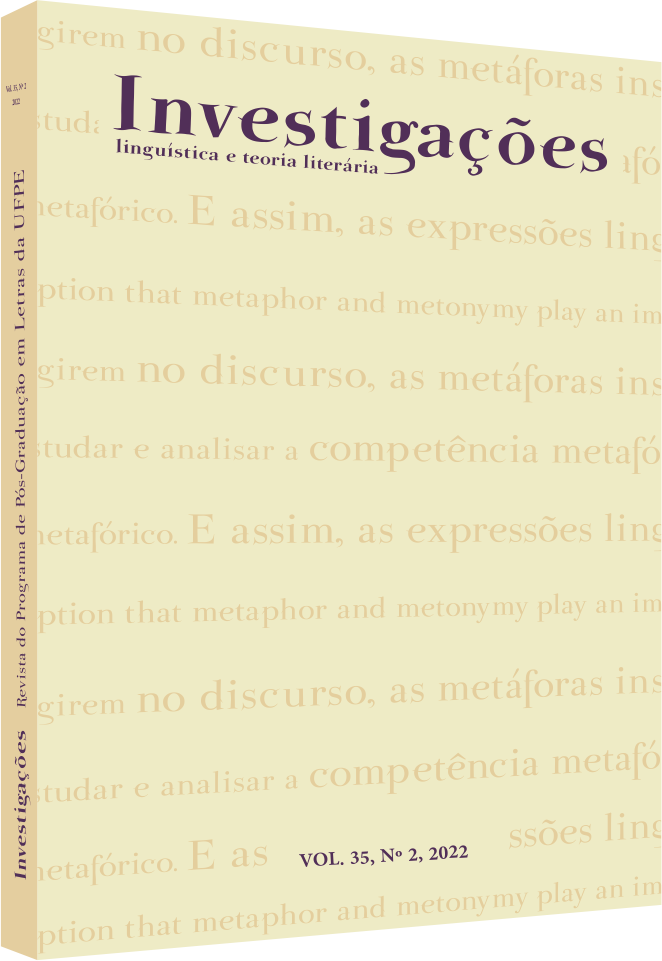Robôs e fake news: disputa de sentidos na prática jornalística
DOI:
https://doi.org/10.51359/2175-294x.2022.254257Keywords:
discourse analysis, journalistic discourse, robots, fake news.Abstract
This article focuses on the discursive functioning of the media, from its link with technology in journalistic discourse. From the theoretical-methodological perspective of materialist discourse analysis, it aims to analyze the ways in which effects of senses are constituted for the robot Fátima, developed by the news checking agency Aos Fatos. In a socio-historical context of wide circulation of fake news, Fátimais a chatbot, whose automated practices produce meaning effects for journalism. In its humanization process, however, it also does not fail to produce effects on the relationships between subjects.References
BAUMAN, Zygmunt. Amor Líquido: Sobre a fragilidade dos laços humanos. Rio de Janeiro: Zahar, 2004.
CHATBOTS: conheça a história dessa fascinante tecnologia. Live University, 15 dez. 2017. Disponível em: <https://liveuniversity.com/chatbots-e-a-historia-dessa-fascinante-tecnologia-2/>. Acesso em: 29 abr. 2021.
COM FOCO na pandemia, Aos Fatos lança a robô checadora Fátima no WhatsApp. Aos fatos, 2020. Disponível em: <https://www.aosfatos.org/noticias/com-foco-na-pandemia-aos-fatos-lanca-robo-checadora-fatima-no-whatsapp/>. Acesso em: 29 abr. 2021.
COURTINE, Jean-Jacques; HAROCHE, Claudine. História do rosto: exprimir e calar as emoções. Tradução de Marcus Penchel. Petrópolis: Vozes, 2016.
DALBEN, Silvia. O uso de robôs no jornalismo brasileiro: três estudos de caso. In: SEMINÁRIO DE PESQUISA EM JORNALISMO INVESTIGATIVO, 6., 2019, São Paulo. Anais... São Paulo: ABRAJI, 2019. Disponível em: <https://projetos.abraji.org.br/seminario/PDF/6/SILVIA _DALBEN-O_uso_de_robos_no_jornalismo_brasileiro_tres_estudos_de_caso.pdf>. Acesso em: 29 abr. 2021.
DELA-SILVA, Silmara. “Checar fatos e desmentir boatos”: fake news e discurso jornalístico no Brasil. Fórum Linguístico, Florianópolis, v. 18, n. 2, abr./jun. 2021.
DIAS, Cristiane. Análise do discurso digital: sujeito, espaço, memória e arquivo. Campinas: Pontes Editores, 2018.
GADET, Françoise.; PÊCHEUX, Michel. A língua inatingível: o discurso na história da linguística. Campinas: Pontes, 2004 [1981].
GALLO, Solange; SILVEIRA, Juliana; PEQUENO, Vitor. Fake news: efeito de fake, efeito de news. In: GRIGOLETTO, Evandra; DE NARDI, Fabiele S.; SOBRINHO, Helson F. (orgs.). Ousar se revoltar: Michel Pêcheux e a análise do discurso no Brasil. Campinas: Pontes, 2021. p. 253-268.
HENRIQUES, Stefania M. O conceito de nome próprio: uma questão linguístico-filosófica. In: SIMPÓSIO INTERNACIONAL DE ENSINO DA LÍNGUA PORTUGUESA, 2., 2012, Minas Gerais. Anais.... v. 2, n. 1. Uberlândia: EDUFU, 2012. Disponível em: <http://www.ileel.ufu.br/anaisdosielp/wp-content/uploads/2014/07/volume_2_artigo_280.pdf>. Acesso em: 12 maio. 2022.
MARIANI, Bethania. O PCB e a imprensa. Os comunistas no imaginário dos jornais 1922-1989. Rio de Janeiro: Revan; Campinas: Unicamp, 1998.
ORLANDI, Eni. Boatos e silêncios: os trajetos dos sentidos, os percursos do dizer. In: ORLANDI, Eni. Discurso e texto: formulação e circulação dos sentidos. Campinas: Pontes, 2001. p. 127-140.
ORLANDI, Eni. Interpretação: autoria, leitura e efeitos do trabalho simbólico. 5. ed. Campinas: Pontes, 2007.
ORLANDI, Eni. Discurso em análise: sujeito, sentido, ideologia. 3. ed. Campinas: Pontes, 2016.
PANDEMIA é tema preferencial da desinformação, afirma estudo. Abert, 2021. Disponível em: <https://www.abert.org.br/web/notmenu/pandemia-e-tema-preferencial-da-desinformacao-afirma-estudo.html>. Acesso em: 10 jun. 2021.
PÊCHEUX, Michel. [1969]. Análise automática do discurso (AAD-69). In: GADET, F.; HAK, T. (orgs.). Por uma análise automática do discurso. 3. ed. Campinas: Editora da Unicamp, 1997. p. 61-167.
PÊCHEUX, Michel. [1982]. Ler o arquivo hoje. In: ORLANDI, Eni. (org.). Gestos de leitura. 3. ed. Campinas: Pontes Editores, 2010. p. 49-59.
QUEM SOMOS. Aos Fatos, 2022. Disponível em: <https://www.aosfatos.org/quem-somos/>. Acesso em: 12 maio. 2022.
RAMONET, Ignacio. Geopolítica da pós-verdade: a informação na era das fake news. In: MORAES, Dênis de (org.). Poder midiático e disputas ideológicas. Rio de Janeiro: Consequência, 2019.
RIFFEL, Cristiane M.; FLORES, Giovanna B. As condições de produção do discurso do jornalismo alternativo digital. In: JORNADA INTERNACIONAL SEM NTICA E ENUNCIAÇÃO (JISE), 3., 2021, Campinas. Anais... Campinas: Galoá, 2021. Disponível em: <https://proceedings.science/jise-2021/papers/as-condicoes-de-producao-do-discurso-do-jornalismo-alternativo-digital-?lang=en>. Acesso em: 12 mai. 2022.
TOUEG, Gabriel. Robôs precisaram aprender a responder ao assédio feito por homens. UOL, 2021. Disponível em: <https://www.uol.com.br/tilt/noticias/redacao/2021/04/08/bia-chatbot-do-bradesco-vai-responder-a-altura-quem-vier-com-assedio.htm>. Acesso em: 11 jun. 2021.
VINHAS, Luciana I. Os robôs do Presidente: o que ainda resta da democracia? In: GALLI, Fernanda.; COSTA, Alcione.; NASCIMENTO, Mizael.; FRANÇA, Thiago. (orgs.). Práticas contemporâneas em Análise do Discurso: gestos (d)e leituras. Recife: Editora da UFPE, 2021. p. 249-265.
VON HAFFTEN, Marie. Robô Fátima dissemina informações verificadas no Brasil. IJNET, 2018. Disponível em: <https://ijnet.org/pt-br/story/rob%C3%B4-f%C3%A1tima-dissemina-informa%C3%A7%C3%B5es-verificadas-no-brasil>. Acesso em: 02 set. 2021.
Downloads
Published
How to Cite
Issue
Section
License
Copyright (c) 2022 Silmara Dela Silva, Fernanda Luzia Lunkes, Ceres Ferreira Carneiro

This work is licensed under a Creative Commons Attribution 4.0 International License.
Authors who publish with Revista Investigações agree to the following terms:
Authors retain copyright and grant the journal right of first publication with the work simultaneously licensed under the Creative Commons Attribution 4.0 International (CC BY 4.0) license that allows others to share the work with an acknowledgement of the work's authorship and initial publication in this journal.
Authors are able to enter into separate, additional contractual arrangements for the non-exclusive distribution of the journal's published version of the work (e.g., post it to an institutional repository or publish it in a book), with an acknowledgement of its initial publication in this journal.
You are free to:
Share — copy and redistribute the material in any medium or format for any purpose, even commercially.
Adapt — remix, transform, and build upon the material for any purpose, even commercially.
The licensor cannot revoke these freedoms as long as you follow the license terms.
Under the following terms:
Attribution — You must give appropriate credit , provide a link to the license, and indicate if changes were made . You may do so in any reasonable manner, but not in any way that suggests the licensor endorses you or your use.
No additional restrictions — You may not apply legal terms or technological measures that legally restrict others from doing anything the license permits.

